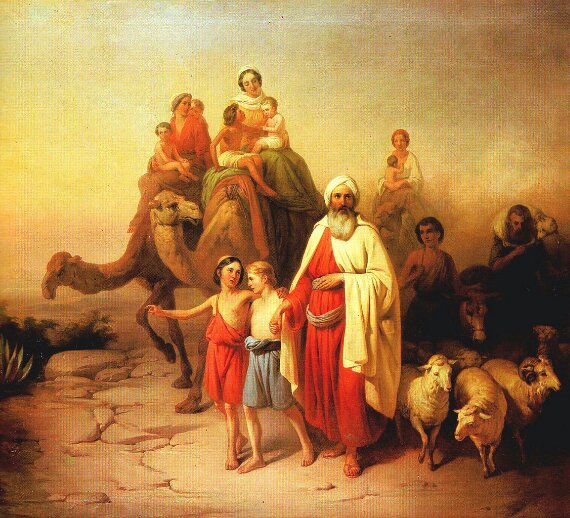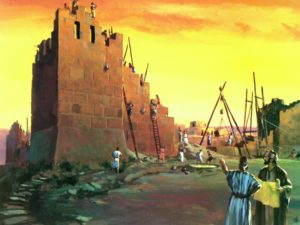Lesson 1 gave a power punched overview of Genesis 1-3 (The Beginning Period). Lesson 2 continues the story of the Bible into what is known as the Pilgrim Period (Genesis 12-46).
Before we get started on the Pilgrim Period, do not think that I forgot about Genesis 4-11. These chapters contain very important information. In James Smith’s book Introduction to Biblical Studies, he devotes an entire chapter to this section of scripture which he entitles the Scattering Period. Genesis 4-11 is essentially Genesis 1-3 all over again. Mankind is given a fresh start with Noah (Gen. 5:29). Noah is even given the same mandate as Adam (see 1:28-30 & 9:1-2). Yet, man fails in his commission once again. This short summary will have to suffice for lack of space and time.
Introducing the Pilgrim Period (Genesis 12-46)
Genesis is traditionally split in two with the first half constituting primeval history (1-11) and the second half patriarchal history (12-50). If our goal was to study Genesis as a single book, this would be the more logical division and approach to take. However, we are studying the Old Testament as a single, continuous story. Roughly three-quarters of Genesis is devoted to the Pilgrim Period which evidences its importance. When the Bible devotes large chunks of writing to a single period of history, person of history, or event in history, pay attention: God wants your attention. This period of Old Testament history gets its name from the nature of the characters within the story. Starting with the first Israelite patriarch Abram, God says, “Get out of your country, from your family, and from your father’s house,” (Gen. 12:1). Abram obeys, and from this point, he and his descendants (Isaac, Jacob, Joseph) become pilgrims in a foreign land, the very land that Israel will wander 40 years to regain. With this context established, let’s get down to what you need to know.
Promise & Prophecy– The single most important passage of Genesis, outside of Genesis 3:15, is Genesis 12:1-3. Within these three verses, God promises Abram four things: 1) Abram will be given Land, 2) Abram will become a great Nation or Government, 3) Abram will become an internationally renowned Name, and 4) Abram will universally Bless all the families of the earth. It is not a coincidence that some form of the word “bless” is repeated five times in this brief span of verses. Some have found this five-fold blessing to be in contrast to the five-fold curses found within the first eleven chapters of the book (3:14, 3:17, 4:11, 5:29, 9:25, Hamilton). These four items of blessing, with special emphasis on the land promise, receive ongoing attention throughout the rest of the book. All these blessings find literal fulfillment in the days of Israel as an independent nation. However, just as with Genesis 3:15, the ultimate and final fulfillment of these promises are found in the Seed, Jesus Christ. Thus, Israel as a kingdom becomes a “type” of a greater kingdom to come with greater blessings. From Abram, and thus the kingdom of Israel, will come the Seed of Eve to crush the serpent’s head (see Lesson 1).
Covenant– The covenant concept is given paramount status in the Pilgrim Period. O. Palmer Robertson in his book The Christ of the Covenants (a book I do not recommend) gives a well rounded definition of covenant-
“a bond in blood.”
Genesis 12:1-3 introduces God’s covenant with Abram that will have universal and eternal effects, though the covenant with Abram is not fully detailed until completing chapter 17. In studying these six chapters, you will learn of the five great criteria of a covenant: 1) The Terms (Gen. 12:1-3), 2) The Conditions (Gen. 15:6, 17:9-14), 3) Animal Sacrifice (Gen. 15:9-10), 4) Blood (implied in Gen. 15:9-10), and 5) Sign of the Covenant (Gen. 17:10-11). With almost every major covenant in the Bible, these five criteria will be found either explicitly or implicitly. Aside from the magnitude this information provides in understanding the New Covenant concept when you get to the Gospels, realizing the role of God’s covenant with Abram is transforming to your reading of the Old Testament. God chose Abram to be the outlet by which the Seed of Gen. 3:15 would come into the world. The covenant of Genesis 12:1-3 is renewed with Isaac (Gen. 26:4-5, 24), with Jacob (Gen. 28:3-4, 12-15, 35:9-15), and presumably with Judah (Gen. 49:10), though the language with Judah does not mirror the other covenant accounts.
Why Genesis 12-46? If perhaps all the above detail seems irrelevant, at least understand this. “The covenant is a pact that God makes with his people throughout history in which he will be their God and they will be his people (called the ‘Immanuel Principle,’ that is, ‘God is with us’),” (John Currid, A Biblical-Theological Introduction to the Old Testament). This Immanuel Principle continuously reveals itself from Genesis to Revelation. God’s relationship with Israel throughout the Old Testament is always determined by their faithfulness to the Covenant (see Exodus 24 & Deuteronomy 28-29). Thus, it is very important that Moses write the book of Genesis to the Israelites while they roam the wilderness lest they forget their identity and mission. God’s mission for Abram and Israel was not to save them and them alone. No, His mission was much farther reaching. His mission was to thwart the Devil in battle, and through the Seed of the covenant, smash Satan and his forces, effectually denying that Dragon the right to accuse God’s people of sin (Revelation 12). Genesis 12-46 is foundational to this continuous storyline.
Homework
Read Genesis 12-50 and identify every time that Land is promised to Abram or his descendants. This will open your eyes to the emphasis that God places on His covenant with Abram and help solidify its importance to the wider scope of the Bible.
Resources– 1) What the Old Testament Authors Really Cared About by Jason DeRouchie, 2) Handbook on the Pentateuch by Victor Hamilton, 3) Introduction to Biblical Studies by James Smith, 4) A Biblical-Theological Introduction to the Old Testament by Miles V. Van Pelt, 5) Covenant and God’s Purpose for the World by Thomas Schreiner




Comments
Very insightful and helpful in grasping the storyline of the Bible
Thank you!
Author
You’re welcome! Thank you for the feedback Mr. Bennett. If you ever want more Bible study resources, keep checking back on the site or email the administrator at ambattey@yahoo.com.